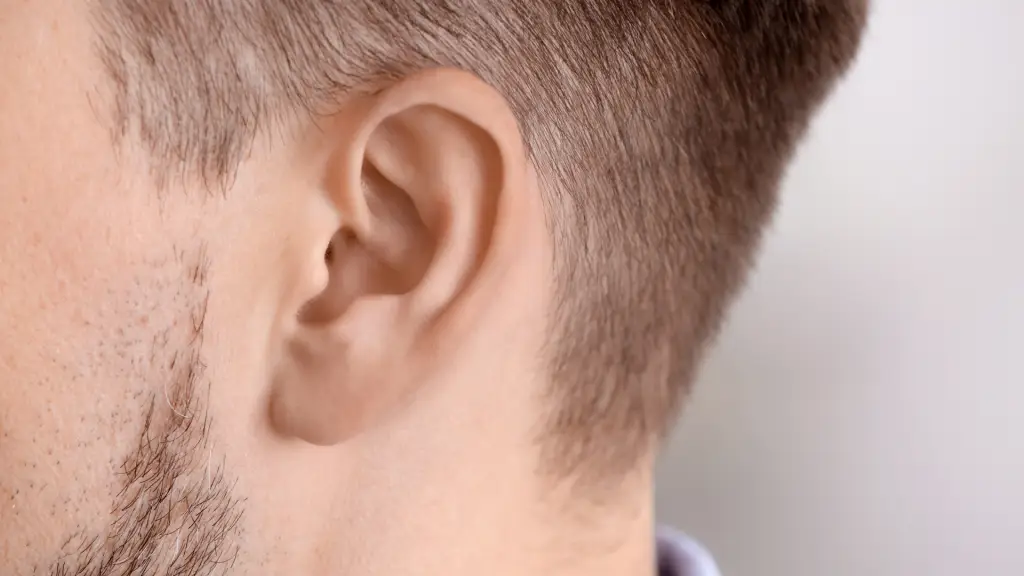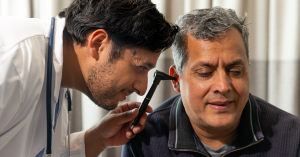It’s easy to brush off muffled sound in one ear as a minor nuisance—maybe it’s just a little congestion or earwax buildup, right? But when one ear suddenly—or gradually—stops hearing well, it’s a sign you should never ignore.
Hearing loss in one ear, also known as unilateral hearing loss, can affect your ability to understand speech, stay safe in your environment, and even signal a more serious underlying health issue. From infections and blockages to neurological conditions and tumors, the causes vary—but the message is the same: don’t wait to get it checked.
So, is hearing loss in one ear serious? Yes, it often is. And in this article, we’ll explore why, what symptoms to look out for, the possible causes behind one-sided hearing loss, and what you should do next—whether it came on suddenly or developed over time.
Because sometimes, one quiet ear is your body’s way of saying something much louder.
What Is Unilateral Hearing Loss?
Unilateral hearing loss means that only one ear experiences reduced or complete loss of hearing, while the other ear functions normally. It can come on suddenly or gradually, and its effects can range from mildly annoying to severely disruptive.
Differences Between Unilateral and Bilateral Hearing Loss
Unilateral hearing loss (UHL) affects one ear only
Bilateral hearing loss affects both ears and is more commonly linked with age-related decline or widespread damage
In unilateral cases, people often retain normal hearing in the unaffected ear, which can mask the seriousness of the problem
Unlike bilateral hearing loss, UHL poses unique challenges:
You may struggle to locate where sounds are coming from (called sound localization)
It’s harder to understand speech in noisy environments, like crowded rooms
You may unconsciously turn your “good ear” toward conversations, which can lead to missed cues and fatigue
Common Symptoms and How It Feels
People with unilateral hearing loss often describe:
A feeling of fullness or pressure in one ear
Muffled or distorted sound, particularly on one side
Trouble hearing conversations when people are speaking on the affected side
Difficulty localizing sounds, such as not knowing where someone is calling from
Tinnitus (ringing) or dizziness, depending on the underlying cause
These symptoms can affect balance, concentration, and confidence, especially in social or work settings. While some cases are temporary and benign, others are urgent medical situations that require quick intervention.
In the next section, we’ll explore what actually causes hearing loss in just one ear, and why prompt diagnosis is crucial.
What Causes Hearing Loss in Just One Ear?
When hearing loss affects just one ear, the range of possible causes is surprisingly wide—from temporary blockages to serious neurological conditions. Understanding the cause and speed of onset is key to determining how serious it is and what to do next.
Sudden vs Gradual Onset
Sudden onset hearing loss in one ear is often a medical emergency. It can occur within hours or days and may be accompanied by ringing (tinnitus), dizziness, or a feeling of ear fullness.
Gradual onset may point to underlying conditions such as earwax buildup, chronic infections, or progressive nerve damage. It tends to go unnoticed until it begins to impact communication or daily function.
Common Causes of One-Ear Hearing Loss
Here are the most frequent reasons hearing may disappear in just one ear:
Earwax Impaction or Fluid Blockage
A buildup of wax or trapped fluid in the ear canal can cause temporary muffling or hearing reduction. Easily treatable, but sometimes misdiagnosed if not examined properly.Middle or Inner Ear Infections
Bacterial or viral infections (like otitis media or labyrinthitis) can damage the ear’s internal structures, especially if untreated.Sudden Sensorineural Hearing Loss (SSHL)
A medical emergency caused by viral infections, circulation issues, or immune system responses. Often idiopathic (no clear cause), and requires treatment within 72 hours for best outcomes.Acoustic Neuroma (Vestibular Schwannoma)
A non-cancerous tumor on the hearing and balance nerve. Causes slow, progressive loss, often with tinnitus and imbalance.Head or Ear Trauma
Blows to the head or sudden pressure changes (e.g., diving injuries) can damage inner ear structures or nerves.Ménière’s Disease
An inner ear disorder characterized by episodic vertigo, ringing, and hearing loss—often starting in one ear.Neurological or Vascular Events
Rarely, strokes or multiple sclerosis can cause one-sided hearing loss, especially if other neurological symptoms are present.
Because the potential causes range from minor to life-altering, it’s essential to diagnose the problem early—especially if it happens suddenly or comes with other symptoms like dizziness or ringing.
Why One-Ear Hearing Loss Can Be a Red Flag
Many people assume that hearing loss in one ear isn’t as serious as losing hearing in both. But in reality, unilateral hearing loss can signal deeper health issues, some of which may require urgent medical intervention.
Potential Medical Emergencies Like SSHL
One of the most alarming causes of one-ear hearing loss is Sudden Sensorineural Hearing Loss (SSHL)—a rapid loss of hearing in one ear, typically occurring over a span of 72 hours or less. It’s considered a medical emergency, and here’s why:
It often points to inner ear nerve damage, which may be permanent if not treated promptly
The exact cause is unknown in many cases, but it may involve viral infections, circulatory blockages, or immune responses
Steroid treatment within the first 24–72 hours gives the best chance of partial or full recovery
Ignoring SSHL symptoms and waiting for them to “clear up” can lead to irreversible hearing loss—which is why early evaluation is critical.
How It Affects Balance, Safety, and Cognitive Load
Hearing in only one ear can create more than just a sound imbalance. It also affects:
Sound localization: Your brain uses both ears to detect where sound is coming from. Losing input from one ear means it’s harder to determine direction—dangerous in traffic, crowds, or emergency situations.
Speech understanding in noise: The ability to filter background noise and focus on one speaker suffers significantly with unilateral hearing loss.
Cognitive strain: With only one ear working, your brain must work harder to fill in gaps, guess meanings, and process conversations—leading to fatigue and even memory issues over time.
Social confidence and communication: You may start avoiding conversations, group settings, or even withdraw from social activities due to frustration or embarrassment.
These impacts highlight why even “mild” hearing loss in one ear deserves attention—it affects far more than just how you hear.
Diagnosis and When to See a Doctor
Whether hearing loss in one ear comes on suddenly or slowly, proper diagnosis is essential. Even if symptoms seem minor, the underlying cause may be serious, and early intervention could make the difference between full recovery and permanent loss.
Tests Used to Assess Single-Ear Hearing Loss
Here’s what a typical evaluation process might include:
Otoscopy: A visual examination of the ear canal and eardrum to check for wax, fluid, or physical damage.
Pure Tone Audiometry: Measures hearing levels at various pitches in each ear separately. Helps determine whether the loss is conductive (mechanical) or sensorineural (nerve-related).
Tympanometry: Tests middle ear function and eardrum movement to assess fluid buildup, pressure issues, or perforations.
Speech Audiometry: Assesses how well you understand spoken words in quiet and noisy environments.
MRI or CT Scans: May be ordered if a tumor (like an acoustic neuroma) or neurological issue is suspected.
Each test helps narrow down what’s causing the hearing loss—and whether treatment is possible.
When to Seek Urgent vs Routine Care
You should seek immediate medical attention if:
Hearing loss in one ear is sudden or rapid
You have accompanying dizziness, nausea, or balance issues
There’s ringing in one ear only (unilateral tinnitus)
You feel pressure or fullness that doesn’t improve after a few days
There’s drainage or blood from the ear
Routine care (within a few days) is appropriate if:
The loss has developed gradually
You’ve had recurrent ear infections or wax buildup
You’ve noticed minor speech or sound clarity issues in one ear only
Don’t wait it out or rely on home remedies. One-sided hearing loss should always be evaluated—because even minor changes may point to a larger problem that’s easier to treat when caught early.
Next, we’ll explore what treatments are available and how to cope or adapt to one-ear hearing loss if it becomes permanent.
Treatment Options and Managing Daily Life
Once the cause of unilateral hearing loss is identified, the next step is treatment or management. While not all cases can be reversed, many are treatable, and others can be supported with technology and strategy to restore quality of life.
Can One-Sided Hearing Loss Be Cured?
The possibility of a full recovery depends largely on the cause and how quickly treatment begins:
Sudden Sensorineural Hearing Loss (SSHL): If caught within 72 hours, steroid therapy (oral or injected) may restore partial or full hearing.
Earwax or fluid blockages: Simple removal or drainage usually restores hearing almost instantly.
Infections: Bacterial infections typically respond to antibiotics; viral cases may require time, monitoring, and supportive care.
Acoustic neuroma: Treatment ranges from monitoring to surgery or radiation. Hearing may or may not return depending on the tumor’s size and location.
Chronic damage: In some cases, permanent damage to the auditory nerve or inner ear structures cannot be reversed—but can be managed effectively.
Coping Tools, Hearing Aids, and Long-Term Strategies
If hearing cannot be fully restored, several tools and techniques can help:
CROS/BiCROS hearing aids: These send sound from the deaf ear to the hearing ear, helping you detect voices from all directions.
Bone conduction devices: Bypass the damaged inner ear by transmitting sound through the skull to the functioning ear.
Assistive listening devices (ALDs): Help with speech clarity in group or noisy settings.
Visual cues and lip-reading: Becoming more conscious of non-verbal communication enhances understanding.
Strategic seating: Position yourself so your good ear is directed toward conversation or noise sources.
It’s also helpful to educate those around you—ask people to speak clearly, face you when talking, and avoid noisy backgrounds when possible.
Most importantly, don’t ignore one-ear hearing loss. Whether it’s reversible or not, modern treatments and tools can dramatically improve your communication, confidence, and safety.
Conclusion: One-Ear Hearing Loss Isn’t Minor – Get It Checked Early
It might seem like no big deal—just one ear feeling a bit muffled, or some sound clarity lost on one side. But hearing loss in one ear can be a red flag, and the sooner you take it seriously, the better your chances of recovery and long-term well-being.
Whether caused by something minor like earwax or something more serious like sudden sensorineural hearing loss or a tumor, unilateral hearing loss should never be ignored. With timely treatment, many cases can be reversed or managed effectively.
So if one ear goes quiet—gradually or suddenly—don’t wait. Seek out a hearing test, consult your GP or ENT, and explore all your options. Because your hearing health isn’t just about what you hear—it’s about how you live, connect, and stay safe in the world.
Frequently Asked Questions
Is hearing loss in one ear a medical emergency?
It can be. Sudden hearing loss in one ear (SSHL) is a medical emergency and should be treated within 72 hours to prevent permanent damage. If the hearing loss is sudden, severe, or accompanied by dizziness or ringing, seek immediate care.
What are the dangers of ignoring it?
Ignoring one-sided hearing loss can lead to:
Missed diagnoses (e.g. tumors, infections, neurological issues)
Permanent hearing damage if not treated in time
Safety risks from impaired sound localization
Cognitive strain and social withdrawal due to communication difficulties
Can you live normally with hearing loss in one ear?
Yes, many people live full lives with one-ear hearing loss, but it often requires adaptation and support. Technologies like CROS hearing aids, bone conduction devices, and strategic listening skills can dramatically improve quality of life.
Will hearing return on its own?
It depends on the cause. Hearing may return with:
Wax removal or infection treatment
Natural recovery from mild fluid buildup
Early steroid treatment for sudden hearing loss
However, sensorineural damage and some chronic conditions may cause permanent loss, so it’s essential to get evaluated early.
How is sudden one-ear hearing loss treated?
Sudden hearing loss is often treated with:
Oral or injected corticosteroids
Antiviral medication (if a viral cause is suspected)
Referral to ENT for imaging and specialist care
Outcomes are best when treatment begins within 24–72 hours.
Is this linked to stroke or brain issues?
In rare cases, yes. Stroke, multiple sclerosis, or brainstem tumors can cause one-sided hearing loss—especially when accompanied by other neurological symptoms. That’s why prompt medical assessment is crucial.






